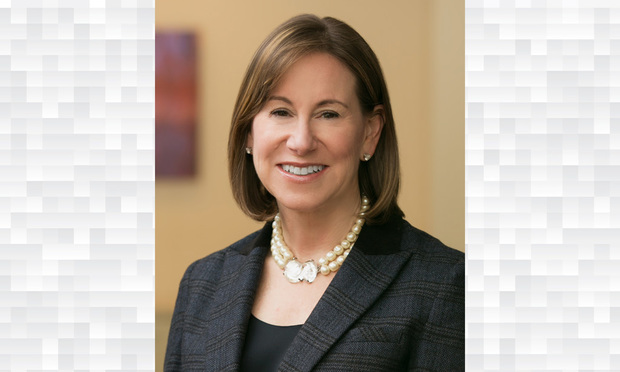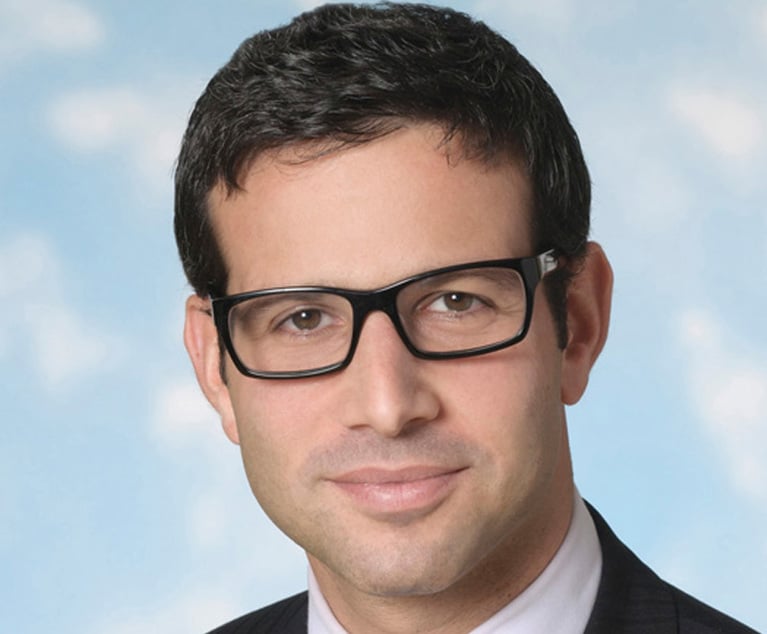Attorney of the Year Finalist: Susan Feigin Harris
It was personal for Susan Feigin Harris to win a huge victory for 12 children's hospitals when a federal court vacated an erroneous administrative rule, allowing her clients and hospitals nationwide to again expect the federal government and their states to compensate them properly for treating large numbers of Medicaid patients.
August 31, 2018 at 06:00 AM
4 minute read
 Morgan Lewis partner Susan Feigin Harris.
Morgan Lewis partner Susan Feigin Harris.
All her life, Houston health care lawyer Susan Feigin Harris grew up immersed in the world of children's hospitals.
Her father, Dr. Ralph Feigin, was a world renowned pediatrician who specialized in infectious diseases, wrote a seminal pediatric disease textbook and served as president of Baylor College of Medicine and physician-in-chief of Texas Children's Hospital. Harris said he helped to build that hospital into what it is today.
That's why it was personal for her to win a huge victory for 12 children's hospitals—Texas Children's and seven other Lone Star State institutions among them—when a federal court vacated an erroneous administrative rule, allowing her clients and hospitals nationwide to again expect the federal government and their states to compensate them properly for treating large numbers of Medicaid patients.
“I watched my father fight for so many years,” said Harris, partner in Morgan, Lewis & Bockius in Houston, who fought the battle alongside Morgan Lewis of counsel Summer Swallow and partner Geri Edens. “This involved children's hospitals and I got to fight for and win on their behalf. It sustains me—it makes me so proud.”
The March 6 memorandum opinion in Children's Hospital Association of Texas v. Azar in the U.S. District Court for the District of Columbia explained that some hospitals treat significantly more patients who use Medicaid, which covers poor or disabled patients and children of any income who have certain serious illnesses—such as premies born under 1,200 grams in weight. Both federal and state funding contributes to Medicaid, which generally pays a hospital less than other types of insurance, creating a financial disadvantage for hospitals that serve a ton of Medicaid patients.
To stabilize their finances and encourage them to take Medicaid patients, Congress provided for supplemental payments to such hospitals. However, Congress later set a limit to how much a hospital can get in supplemental payments, based on a calculation involving a hospital's uncompensated costs to treat Medicaid patients.
The case challenged a rule that defined “uncompensated costs” used in the calculation of the limit. The rule by the Centers for Medicare & Medicaid Services said uncompensated costs were costs for which a hospital hadn't received any third-party payment from any source. If the hospital received some payment from Medicare or private insurance, they had to subtract it, along with any payment they got from Medicaid itself.
The plaintiffs argued that the Medicare Act had its own definition of uncompensated costs: The cost to care for Medicaid patients, minus any payments from Medicaid and uninsured patients. They argued that the defendants acted outside their authority in the Medicaid Act by making hospitals subtract any other third-party payments.
The defendants countered that the Medicaid Act clearly says that only “uncompensated” costs should be included. They argued that well-compensated costs don't count as uncompensated, according to the opinion.
U.S. District Judge Emmet G. Sullivan wrote, siding with the plaintiffs, found that the rule was inconsistent with the Medicaid Act. The act said that only Medicaid payments and uninsured patients' payments could be subtracted from the total costs. Nowhere did the law mention subtracting other third-party payments.
The court vacated the Centers for Medicare & Medicaid Services' rule, eliminating it all over the country.
The government defendants have appealed to the U.S. Circuit Court of Appeals for the D.C. Circuit.
Harris noted that if she had lost the case, there was a lot on the line, because some hospitals were “in the red” without the Medicaid supplemental payment funds at issue, ranging from an estimated $9 million to $80 million annually, depending on the hospital. On the dire end, some smaller, rural hospitals might have closed eventually. Not so drastic elsewhere, the funding gap nevertheless would have forced larger hospitals to think of laying off non-essential staff, scaling back technological investments and research initiatives, or canceling social service or outreach programs.
“It was so significant: It eliminated all their supplemental dollars,” explained Harris. “Hospitals provide these services, whether they are covered or not, to all patients. The fact they may be chronically underpaid by the Medicaid program doesn't mean just those patients are affected—It affects every patient.”
Angela Morris is a freelance journalist. Follow her on Twitter at @AMorrisReports
This content has been archived. It is available through our partners, LexisNexis® and Bloomberg Law.
To view this content, please continue to their sites.
Not a Lexis Subscriber?
Subscribe Now
Not a Bloomberg Law Subscriber?
Subscribe Now
NOT FOR REPRINT
© 2025 ALM Global, LLC, All Rights Reserved. Request academic re-use from www.copyright.com. All other uses, submit a request to [email protected]. For more information visit Asset & Logo Licensing.
You Might Like
View All
Kirkland's Daniel Lavon-Krein: Staying Ahead of Private Equity Consolidation

Vinson & Elkins: Traditional Energy Practice Meets Energy Transition
4 minute read
Advising 'Capital-Intensive Spaces' Fuels Corporate Practice Growth For Haynes and Boone
4 minute read
Get to Know Texas Lawyer's Attorney of the Year Finalists
Trending Stories
- 1CFPB Labor Union Files Twin Lawsuits Seeking to Prevent Agency's Closure
- 2Crypto Crime Down, Hacks Up: Lawyers Warned of 2025 Security Shake-Up
- 3Atlanta Calling: National Law Firms Flock to a ‘Hotbed for Talented Lawyers’
- 4Privacy Suit Targets Education Department Over Disclosure of Student Financial Data to DOGE
- 5Colwell Law Group Founder Has Died in Skiing Accident
Who Got The Work
J. Brugh Lower of Gibbons has entered an appearance for industrial equipment supplier Devco Corporation in a pending trademark infringement lawsuit. The suit, accusing the defendant of selling knock-off Graco products, was filed Dec. 18 in New Jersey District Court by Rivkin Radler on behalf of Graco Inc. and Graco Minnesota. The case, assigned to U.S. District Judge Zahid N. Quraishi, is 3:24-cv-11294, Graco Inc. et al v. Devco Corporation.
Who Got The Work
Rebecca Maller-Stein and Kent A. Yalowitz of Arnold & Porter Kaye Scholer have entered their appearances for Hanaco Venture Capital and its executives, Lior Prosor and David Frankel, in a pending securities lawsuit. The action, filed on Dec. 24 in New York Southern District Court by Zell, Aron & Co. on behalf of Goldeneye Advisors, accuses the defendants of negligently and fraudulently managing the plaintiff's $1 million investment. The case, assigned to U.S. District Judge Vernon S. Broderick, is 1:24-cv-09918, Goldeneye Advisors, LLC v. Hanaco Venture Capital, Ltd. et al.
Who Got The Work
Attorneys from A&O Shearman has stepped in as defense counsel for Toronto-Dominion Bank and other defendants in a pending securities class action. The suit, filed Dec. 11 in New York Southern District Court by Bleichmar Fonti & Auld, accuses the defendants of concealing the bank's 'pervasive' deficiencies in regards to its compliance with the Bank Secrecy Act and the quality of its anti-money laundering controls. The case, assigned to U.S. District Judge Arun Subramanian, is 1:24-cv-09445, Gonzalez v. The Toronto-Dominion Bank et al.
Who Got The Work
Crown Castle International, a Pennsylvania company providing shared communications infrastructure, has turned to Luke D. Wolf of Gordon Rees Scully Mansukhani to fend off a pending breach-of-contract lawsuit. The court action, filed Nov. 25 in Michigan Eastern District Court by Hooper Hathaway PC on behalf of The Town Residences LLC, accuses Crown Castle of failing to transfer approximately $30,000 in utility payments from T-Mobile in breach of a roof-top lease and assignment agreement. The case, assigned to U.S. District Judge Susan K. Declercq, is 2:24-cv-13131, The Town Residences LLC v. T-Mobile US, Inc. et al.
Who Got The Work
Wilfred P. Coronato and Daniel M. Schwartz of McCarter & English have stepped in as defense counsel to Electrolux Home Products Inc. in a pending product liability lawsuit. The court action, filed Nov. 26 in New York Eastern District Court by Poulos Lopiccolo PC and Nagel Rice LLP on behalf of David Stern, alleges that the defendant's refrigerators’ drawers and shelving repeatedly break and fall apart within months after purchase. The case, assigned to U.S. District Judge Joan M. Azrack, is 2:24-cv-08204, Stern v. Electrolux Home Products, Inc.
Featured Firms
Law Offices of Gary Martin Hays & Associates, P.C.
(470) 294-1674
Law Offices of Mark E. Salomone
(857) 444-6468
Smith & Hassler
(713) 739-1250






